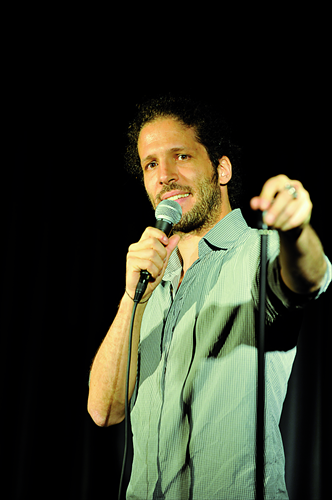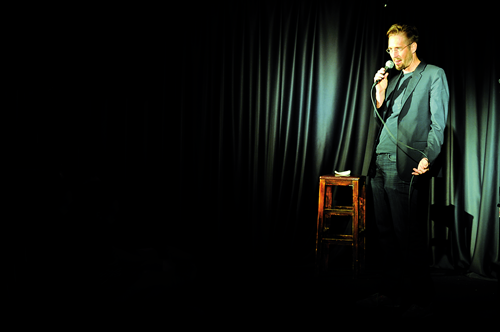Just joking! Westerners are changing the face of comedy in China
Have you heard the one about the foreign comic in Shanghai? Neither have most people. Still in its nascent stages and relegated to the backrooms of bars, stand-up comedy is struggling to break into Shanghai's mainstream nightlife.
China might have a reputation around the world for being too serious, but in fact Chinese culture has a long history of humor. Dating back to the Qing Dynasty (1644-1911), the earliest forms of xiangsheng (cross talk) developed in teahouses to entertain patrons with comedic storytelling.
Following the founding of the People's Republic of China in 1949, the satirical social commentary of cross talk became regarded as a "proletarian art form." By the 1980s, with the advent of household television, cross talk skits were given a national stage.
Xiangsheng relies on rapidly recited wordplay between two performers, which is perhaps why its colloquial dialogue tends to get lost in translation. And just as crosstalk has yet to go cross-cultural, Western-style stand-up, with its sarcasm and sordid subject matter, has not really caught on among the Chinese.
But the underground nature of Shanghai's comedy scene is exactly what is fueling the routines of some foreigners here who are trying to break into stand-up.
One such newcomer to the stage is an old China hand. Expatriate Lee Mack from the US has called China home for 15 years, and has spent most of that time working at one of its original English-language magazines. Mack was known among his colleagues for his wry wit, which went well with after-work cocktails but not so much within the confines of the publication.
After resigning last year, Mack was ready to unleash onto the public a decade's worth of annotations and anecdotes, which he keeps in a well-worn notepad in his back pocket. But rather than write a memoir as many past expats have, the acerbic American took to the stage.
Unlike the well-rehearsed banter of cross talk, stand-up is solo and draws largely from personal experiences, which foreigners like Mack have a wealth of. But with few venues in Shanghai willing to navigate the complex bureaucracy to obtain a performance license, the options for aspiring comics are limited.
Enter stage right Andy Curtain from Australia, literally a guy who walked into a bar. Hoping to tell a few jokes and score some free libation, Curtain failed to find any stand-up venues in Shanghai so in 2011 he founded Kungfu Komedy to give a voice to the voiceless. The troupe's popularity was a surprising indication of how willing Shanghai expats, who have a reputation for snobbery, were to laugh at themselves. Today it claims to be the Chinese mainland's only full-time comedy club.
Despite still being consigned to the back of a bar (currently The Camel on Yueyang Road), Curtain sees cosmopolitan Shanghai as a fertile frontier for the new wave of multinational comedians. Kungfu Komedy hosts headliners from overseas as well as open mic nights to give homegrown and foreign talent free stage time to test their material and self-vet their subversive shtick.
The Global Times took notes at a recent open mic night.
Andy Curtain, Australia

I feel like in China if you smile you can say anything. I was in a park the other day when a smiling old guy came up to me and said: "Good afternoon - go home!" He was the most polite racist I have ever met in my whole life. He just told me to get out of his country, but he was so friendly about it, I didn't know what to say. A part of me wanted to fight him, but he was like 80 years old, he's lived through the hardest times in China's history, he's probably much tougher than he looks. So I went home.
Laurent Ginioux, France

The only problem with Chinese food is that the worse it tastes the better it is for your health. Which means that stinky tofu might be the cure for cancer. When I think of traditional Chinese medicine, I can't help but think about the very first guy who tried tiger penis. Like this guy woke up one day with a hangover and said to himself: "I know, I'm going to put a tiger penis into my mouth!"
Mohammed Magdi, Egypt

I went to an arcade in Shanghai the other day. This is where all the teenagers go. Nobody is in school studying, everyone is there. They are crazy about car racing games. And it finally made sense to me: these kids are destined to be taxi drivers. We make fun of taxi drivers for breaking all the traffic rules, but they think they are gaining points when they do that. They've played so many arcade games that they must really think they'll get a gold coin every time they hit a pedestrian.
Lee Mack, the US

Lee Mack incorporates 15 years worth of expat experiences in China into his stand-up routine. Photos: Tom Carter/GT
The reason I got into comedy is because I used to be a managing editor at an expat magazine. I'd heard from the editors of all the other expat magazines that getting laid by the public relations girls in this city in exchange for media coverage for their clients was a big perk for them. But for me, whenever I'd drop some hints to get these girls into bed they would just laugh at me and say: "Oh Lee, you're so funny, always telling jokes. You really ought to do stand-up comedy."